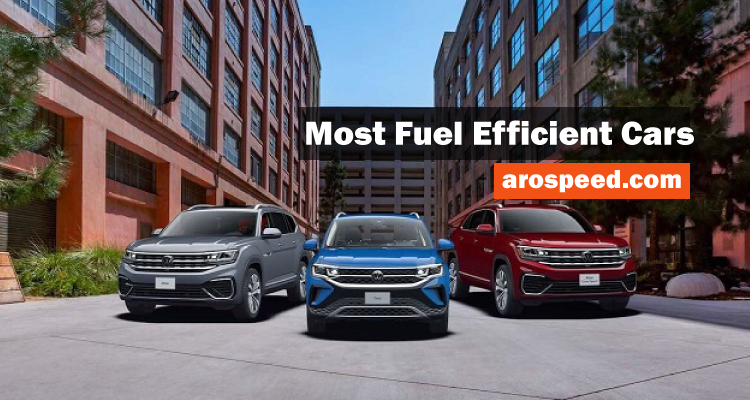In a world where environmental consciousness converges with economic prudence, the quest for fuel-efficient cars has become more pivotal than ever. This article delves into the realm of automotive efficiency, presenting a comprehensive guide to the 20 most fuel efficient cars of the moment. From iconic hybrids like the Toyota Prius to cutting-edge electric vehicles like the Tesla Model 3, this compilation offers a diverse array of choices for eco-conscious consumers.
As we navigate the landscape of evolving technologies and environmental responsibilities, understanding the fuel efficiency landscape becomes not just a preference but a necessity. Join us on a journey through the top 20 fuel-efficient cars, where sustainability meets innovation on the open road.
| Car Models | Fuel Efficiency |
| Toyota Prius | 58 mpg (combined) |
| Hyundai Ioniq | 58 mpg (combined) |
| Honda Insight | 52 mpg (combined) |
| Tesla Model 3 (Electric) | 141 MPGe (combined) |
| Chevrolet Bolt EV (Electric) | 118 MPGe (combined) |
| Lexus UX Hybrid | 39 mpg (combined) |
| Ford Fusion Hybrid | 42 mpg (combined) |
| Kia Niro | 49 mpg (combined) |
| Hyundai Sonata Hybrid | 52 mpg (combined) |
| Tesla Model S (Electric) | 115 MPGe (combined) |
| Toyota Camry Hybrid | 52 mpg (combined) |
| Chevrolet Malibu Hybrid | 46 mpg (combined) |
| Kia Soul (Electric) | 114 MPGe (combined) |
| Ford Escape Hybrid | 41 mpg (combined) |
| Nissan Leaf (Electric) | 104 MPGe (combined) |
| BMW i3 (Electric) | 113 MPGe (combined) |
| Audi A3 Sportback e-tron | 83 MPGe (combined) |
| Hyundai Kona Electric | 120 MPGe (combined) |
| Chevrolet Spark (Electric) | 119 MPGe (combined) |
| Toyota RAV4 Hybrid | 40 mpg (combined) |
Table of Contents
20 Most Fuel Efficient Cars
Certainly! Here we will discuss 20 most fuel efficient cars, including a mix of hybrids and electric vehicles. The fuel efficiency is measured in miles per gallon equivalent (MPGe) for electric cars and miles per gallon (mpg) for hybrids.
Toyota Prius
The Toyota Prius stands as an iconic pioneer in the realm of fuel-efficient vehicles, boasting an impressive combined fuel efficiency of 58 miles per gallon (mpg). Launched as one of the first mass-produced hybrid cars, the Prius seamlessly integrates a gasoline engine with an electric motor, optimizing fuel consumption.
Its innovative design, aerodynamics, and regenerative braking contribute to its outstanding efficiency. Beyond the numbers, the Prius has become synonymous with eco-conscious driving, symbolizing Toyota’s commitment to sustainability and setting a benchmark for hybrid technology in the automotive industry. Efficient, reliable, and environmentally conscious, the Toyota Prius continues to redefine modern motoring.
Hyundai Ioniq
The Hyundai Ioniq epitomizes fuel efficiency with an impressive combined rating of 58 miles per gallon (mpg). This eco-friendly marvel combines a sleek design with cutting-edge hybrid technology. Its efficient powertrain, incorporating a gasoline engine and an electric motor, ensures a harmonious blend of performance and conservation.
The Ioniq’s commitment to sustainability extends beyond its remarkable fuel efficiency, with features like regenerative braking and aerodynamic enhancements. As Hyundai’s dedication to eco-conscious motoring, the Ioniq not only delivers on fuel savings but also represents a leap forward in the pursuit of environmentally responsible driving experiences.
Honda Insight
The Honda Insight stands as a beacon of fuel efficiency, boasting a commendable combined fuel rating of 52 miles per gallon (mpg). As a hybrid sedan, the Insight seamlessly marries performance with environmental consciousness. Its sophisticated hybrid powertrain harmonizes a gasoline engine and an electric motor, optimizing fuel consumption in various driving conditions.
The Insight’s aerodynamic design and innovative engineering contribute to its exceptional efficiency. Honda’s commitment to sustainable mobility is evident in the Insight, offering drivers not only impressive fuel savings but a compelling driving experience that aligns with the growing demand for eco-friendly and efficient transportation.
Tesla Model 3 (Electric)
The Tesla Model 3, an epitome of electric innovation, redefines efficiency with an astounding combined rating of 141 miles per gallon equivalent (MPGe). As an all-electric marvel, the Model 3 discards traditional fuel entirely, running solely on electricity. Its sleek design and cutting-edge battery technology contribute to an impressive range and energy efficiency.
Beyond its green credentials, the Model 3 offers a thrilling driving experience with instant torque and minimalist design. Tesla’s commitment to sustainability and groundbreaking electric performance is encapsulated in the Model 3, symbolizing a transformative shift towards emission-free motoring.
Chevrolet Bolt EV (Electric)
The Chevrolet Bolt EV stands as a trailblazer in electric mobility, showcasing remarkable fuel efficiency with a combined rating of 118 miles per gallon equivalent (MPGe). As an all-electric vehicle, the Bolt EV embraces an emission-free future, relying solely on electricity. Its versatile design and advanced battery technology offer an impressive range, making it a practical choice for eco-conscious drivers.
Chevrolet’s commitment to sustainable transportation is evident in the Bolt EV, providing not only exceptional energy efficiency but also contributing to the ongoing revolution in electric vehicles, bringing innovation and environmental responsibility to the forefront of modern driving.
Lexus UX Hybrid
The Lexus UX Hybrid epitomizes luxury and efficiency, showcasing a combined fuel efficiency of 39 miles per gallon (mpg). As a hybrid, it seamlessly marries elegance with eco-conscious driving. The UX Hybrid boasts a sophisticated powertrain, integrating a gasoline engine with an electric motor for a harmonious balance of performance and fuel conservation.
Lexus’s dedication to crafting premium vehicles extends to the UX Hybrid, offering not only a luxurious driving experience but also a commitment to environmental sustainability. With its sleek design and innovative hybrid technology, the Lexus UX Hybrid exemplifies a union of opulence and efficiency in the automotive landscape.
Ford Fusion Hybrid
The Ford Fusion Hybrid exemplifies efficiency and style with an impressive combined fuel rating of 42 miles per gallon (mpg). A seamless fusion of cutting-edge technology and eco-conscious design, this hybrid sedan optimizes fuel consumption. The Fusion Hybrid employs a sophisticated powertrain, blending a gasoline engine with an electric motor for a refined driving experience.
Ford’s commitment to sustainability is evident in the Fusion Hybrid, providing drivers not only with fuel savings but also a sleek, modern design. With its efficient performance and environmentally friendly features, the Ford Fusion Hybrid represents a harmonious balance between innovation and eco-conscious motoring.
Kia Niro
The Kia Niro shines as an exemplar of fuel efficiency, boasting an impressive combined rating of 49 miles per gallon (mpg). This crossover SUV seamlessly blends versatility with eco-conscious design, making it a practical choice for modern drivers. The Niro’s hybrid powertrain, which combines a gasoline engine with an electric motor, delivers optimal fuel consumption.
Kia’s dedication to providing efficient and reliable vehicles is showcased in the Niro, offering a spacious and stylish option for those seeking both sustainability and functionality. With its commendable fuel efficiency, the Kia Niro stands as a testament to the evolving landscape of environmentally conscious automotive solutions.
Hyundai Sonata Hybrid
The Hyundai Sonata Hybrid radiates efficiency with an impressive combined fuel rating of 52 miles per gallon (mpg). As a hybrid sedan, it seamlessly blends modern design with eco-conscious technology. The Sonata Hybrid’s innovative powertrain, combining a gasoline engine with an electric motor, delivers a smooth and fuel-efficient driving experience.
Hyundai’s commitment to sustainability is evident in the Sonata Hybrid, offering drivers a stylish and environmentally friendly option. With its sleek design, advanced features, and impressive fuel efficiency, the Sonata Hybrid stands as a testament to Hyundai’s dedication to crafting vehicles that prioritize both performance and environmental responsibility.
Tesla Model S (Electric)
The Tesla Model S, an epitome of electric luxury, showcases extraordinary fuel efficiency with a combined rating of 115 miles per gallon equivalent (MPGe). As a revolutionary all-electric sedan, the Model S exemplifies Tesla’s commitment to sustainability. Its cutting-edge battery technology, sleek design, and Ludicrous Mode for exhilarating acceleration contribute to an unparalleled driving experience.
Beyond its remarkable efficiency, the Model S signifies a transformative shift towards emissions-free motoring, redefining standards for electric vehicles. Tesla’s dedication to innovation and environmental responsibility is eloquently embodied in the Model S, marking a milestone in the evolution of electric luxury vehicles.
Toyota Camry Hybrid
The Toyota Camry Hybrid, a paragon of fuel efficiency, boasts an impressive combined rating of 52 miles per gallon (mpg). This hybrid sedan seamlessly merges Toyota’s renowned reliability with eco-conscious design. The Camry Hybrid’s advanced powertrain, incorporating a gasoline engine and an electric motor, ensures a smooth and fuel-efficient driving experience.
Toyota’s commitment to sustainable mobility is evident in the Camry Hybrid, offering drivers not only a dependable and stylish vehicle but also a greener alternative. With its practicality, efficiency, and enduring popularity, the Toyota Camry Hybrid stands as a testament to the brand’s dedication to a more sustainable automotive future.
Chevrolet Malibu Hybrid
The Chevrolet Malibu Hybrid exemplifies a harmonious blend of style and fuel efficiency, boasting an impressive combined rating of 46 miles per gallon (mpg). This hybrid sedan embodies Chevrolet’s commitment to offering eco-conscious options without compromising performance. The Malibu Hybrid’s innovative powertrain, combining a gasoline engine with an electric motor, delivers optimal fuel economy on the road.
With its sleek design and environmentally friendly features, the Malibu Hybrid provides drivers with an attractive and efficient choice. Chevrolet’s dedication to blending practicality with sustainability is evident in the Malibu Hybrid, marking a stride towards greener motoring solutions.
Kia Soul (Electric)
The Kia Soul (Electric) stands out as a beacon of efficiency in the electric vehicle landscape, showcasing an impressive combined fuel efficiency rating of 114 miles per gallon equivalent (MPGe). This all-electric crossover harmonizes distinct design with a commitment to sustainability. The Soul’s electric powertrain offers not only an emission-free driving experience but also efficient energy consumption.
Kia’s dedication to innovation is evident in the Soul (Electric), providing drivers with a unique and eco-conscious choice. With its quirky design and outstanding fuel efficiency, the Kia Soul (Electric) captures the essence of a forward-thinking approach to electric mobility.
Ford Escape Hybrid
The Ford Escape Hybrid exemplifies a fusion of efficiency and versatility, featuring an impressive combined fuel efficiency of 41 miles per gallon (mpg). As a hybrid SUV, it marries Ford’s legacy of robust performance with eco-conscious design. The Escape Hybrid’s advanced powertrain, integrating a gasoline engine with an electric motor, delivers a seamless and fuel-efficient driving experience.
With its spacious interior and innovative technology, this hybrid SUV offers a practical and environmentally friendly choice for modern drivers. Ford’s commitment to sustainability is vividly demonstrated in the Escape Hybrid, presenting a compelling option for those seeking both efficiency and versatility in their daily travels.
Nissan Leaf (Electric)
The Nissan Leaf (Electric) stands at the forefront of electric mobility, boasting a remarkable combined fuel efficiency of 104 miles per gallon equivalent (MPGe). This fully electric hatchback embodies Nissan’s commitment to sustainable transportation. The Leaf’s efficient electric powertrain provides a smooth, emission-free driving experience, making it an ideal choice for eco-conscious commuters.
With its sleek design and practical features, the Leaf continues to redefine the electric vehicle landscape. Nissan’s dedication to innovation and environmental responsibility is evident in the Leaf, offering drivers a forward-thinking option in the pursuit of a greener automotive future.
BMW i3 (Electric)
The BMW i3 (Electric) represents the epitome of electric luxury with an impressive combined fuel efficiency of 113 miles per gallon equivalent (MPGe). As a pioneering electric vehicle, the i3 seamlessly combines sustainability with cutting-edge design and performance. BMW’s commitment to innovation is evident in the i3’s advanced electric powertrain, providing not only exceptional fuel efficiency but also a dynamic driving experience.
With its distinctive design, sustainable materials, and forward-thinking technology, the i3 marks a milestone in the evolution of electric mobility. BMW’s dedication to a sustainable and exhilarating driving future is embodied in the i3, setting new standards in electric luxury.
Audi A3 Sportback e-Tron
The Audi A3 Sportback e-Tron is a pinnacle of plug-in hybrid efficiency, featuring an admirable combined fuel efficiency of 83 miles per gallon equivalent (MPGe). This dynamic hatchback seamlessly integrates Audi’s renowned performance with eco-conscious technology. The A3 e-Tron’s innovative plug-in hybrid powertrain, harmonizing a gasoline engine with an electric motor, delivers optimal efficiency without compromising driving dynamics.
Audi’s commitment to progressive engineering is evident in the A3 e-Tron, offering drivers an exhilarating and environmentally conscious choice. With its sophisticated design and forward-thinking technology, the A3 Sportback e-Tron represents Audi’s dedication to a sustainable and electrifying driving future.
Hyundai Kona Electric
The Hyundai Kona Electric stands as a beacon of electric mobility, boasting an impressive combined fuel efficiency of 120 miles per gallon equivalent (MPGe). As a fully electric SUV, it signifies Hyundai’s commitment to sustainable and efficient transportation. The Kona Electric’s advanced electric powertrain delivers not only an emission-free driving experience but also exceptional efficiency and range.
Hyundai’s dedication to innovation is vividly showcased in the Kona Electric, offering drivers a versatile and eco-conscious choice. With its bold design, practical features, and exceptional fuel efficiency, the Kona Electric marks a significant stride in the evolution of electric vehicles.
Chevrolet Spark (Electric)
The Chevrolet Spark (Electric) exemplifies compact efficiency with its electric powertrain. While the specific fuel efficiency may vary, electric vehicles like the Spark often achieve the equivalent of over 100 miles per gallon. As a fully electric car, the Spark symbolizes Chevrolet’s dedication to sustainable urban mobility.
Its compact design and emission-free driving experience make it an ideal choice for city dwellers. The Spark (Electric) is not only an efficient mode of transportation but also a testament to Chevrolet’s commitment to providing eco-conscious alternatives, marking a positive stride in the pursuit of sustainable and electric mobility.
Toyota RAV4 Hybrid
The Toyota RAV4 Hybrid stands as a pioneer in fuel-efficient SUVs, delivering an impressive combination of power and eco-consciousness. While the specific fuel efficiency may vary, this hybrid SUV typically achieves around 40 miles per gallon (mpg) combined. Toyota’s commitment to sustainability is evident in the RAV4 Hybrid, which seamlessly integrates a gasoline engine with an electric motor for optimal fuel efficiency.
With its spacious design, versatile capabilities, and an environmentally friendly approach, the RAV4 Hybrid represents a pragmatic choice for those seeking both performance and a reduced carbon footprint, embodying Toyota’s dedication to a greener automotive future.
Why Fuel Efficiency Matters?
Fuel efficiency stands as a cornerstone in the contemporary automotive landscape, intertwining environmental sustainability with economic prudence. Beyond the immediate benefits of cost savings at the pump, the significance of fuel efficiency extends to a broader, global scale.
Embracing fuel-efficient vehicles translates to a tangible reduction in carbon emissions, playing a crucial role in mitigating climate change. As consumers increasingly prioritize eco-friendly choices, fuel efficiency becomes a key criterion, fostering a collective responsibility toward a greener future.
This article unravels the multifaceted importance of fuel efficiency, shedding light on its ripple effects, from individual financial savings to the larger mission of building a more sustainable and environmentally conscious automotive industry.
Factors Affecting Fuel Efficiency
Fuel efficiency in vehicles is influenced by a multitude of factors, each playing a crucial role in determining how far a vehicle can travel on a gallon of fuel.
- Engine Technology: The design and efficiency of the engine significantly impact fuel consumption. Advanced technologies, such as direct injection and variable valve timing, contribute to improved efficiency.
- Vehicle Weight: Heavier vehicles generally consume more fuel. Lighter materials and innovative construction techniques help reduce weight, positively affecting fuel efficiency.
- Aerodynamics: The shape and aerodynamic profile of a vehicle affect its drag coefficient. Streamlined designs reduce air resistance, enhancing fuel efficiency.
- Tire Resistance: The type and condition of tires impact rolling resistance. Low rolling resistance tires reduce the energy required to move the vehicle, improving fuel economy.
- Transmission Efficiency: Vehicles with advanced transmissions, such as CVTs (Continuously Variable Transmissions), can optimize the power delivery, positively affecting fuel efficiency.
- Driving Habits: Aggressive driving, rapid acceleration, and high-speed driving can lead to increased fuel consumption. Adopting smooth driving habits contributes to better fuel efficiency.
- Maintenance: Regular maintenance, including timely oil changes and air filter replacements, ensures the engine operates optimally, maintaining fuel efficiency.
Understanding and optimizing these factors collectively contribute to achieving and maintaining high levels of fuel efficiency in vehicles.
Role of Innovations in Fuel Efficiency
The relentless pursuit of fuel efficiency has spurred a wave of innovations in the automotive industry, shaping the way vehicles consume and conserve energy. Technological breakthroughs have revolutionized engine design, with advancements like direct injection and turbocharging enhancing combustion efficiency.
Electric and hybrid technologies represent a paradigm shift, offering sustainable alternatives that redefine the concept of fuel efficiency. Smart materials, such as lightweight alloys and carbon fiber, contribute to vehicle weight reduction, while sophisticated aerodynamics and advanced transmissions optimize performance.
From regenerative braking systems to predictive analytics for efficient route planning, innovations continue to elevate fuel efficiency standards. This dynamic landscape showcases how cutting-edge technologies not only drive automotive evolution but also pave the way for a more sustainable and fuel-efficient future.
Challenges in Achieving High Fuel Efficiency
Despite the growing emphasis on fuel efficiency, several challenges persist in achieving and maintaining high levels of efficiency in the automotive industry.
- Power and Fuel Economy Balancing Act: Striking the right balance between engine power and fuel economy remains a significant challenge. Increasing power often correlates with higher fuel consumption, posing a dilemma for manufacturers to optimize both aspects.
- Regulatory Challenges: Meeting stringent environmental regulations requires continuous innovation. Compliance with emission standards and fuel efficiency mandates necessitates substantial investments in research and development.
- Consumer Expectations: Consumer demands for larger, more powerful vehicles can counteract efforts to enhance fuel efficiency. Balancing consumer preferences with environmental concerns poses a perpetual challenge.
- Cost Implications: Implementing advanced technologies to boost fuel efficiency can increase manufacturing costs. The challenge lies in making these technologies accessible without significantly driving up the price for consumers.
- Infrastructure Limitations: The widespread adoption of alternative fuel sources, such as electric vehicles, faces challenges related to charging infrastructure. Limited charging stations hinder the seamless integration of energy-efficient alternatives.
Overcoming these challenges requires collaborative efforts from manufacturers, policymakers, and consumers to foster a more sustainable and fuel-efficient future in the automotive landscape.
Conclusion
In the dynamic landscape of automotive innovation, the journey through the 20 most fuel efficient cars underscores a collective commitment to sustainability and efficiency. From pioneering hybrids like the Toyota Prius to cutting-edge electric marvels like the Tesla Model 3, these vehicles represent a paradigm shift towards eco-conscious motoring.
Each model, with its unique blend of technology and design, stands as a testament to the industry’s dedication to reducing environmental impact without compromising performance. As we navigate a future where fuel efficiency is not just a preference but a necessity, these cars illuminate a path towards a greener, more sustainable automotive landscape.








Comments